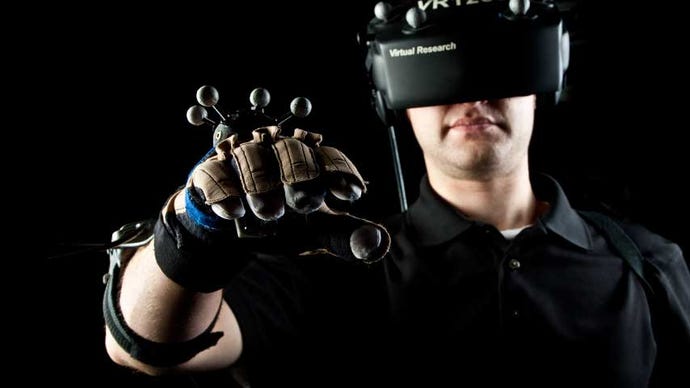Virtual reality: by gum, it's really happening
Virtual reality has exited the realm of peripheral gimmick and turned into something that just might go mainstream.
VR has an uphill battle ahead of it. The tech is going to be expensive, and there are a number of problems that need to be solved before it could be considered an inclusive technology (motion sickness, weight issues and real comfort for spectacles-wearers, for a start).
Perhaps more damningly, there's this persistent idea loudly trumpeted in comment sections that VR is just a gimmick - a peripheral or add-on like PlayStation Move, Kinect or stereoscopic 3D, that does little to change or improve gaming. Moreover, it's a tech that really has to be experienced to be believed, and too many people think they have experienced it, based on dodgy 80's tech or even very early Oculus Rift demos.
I personally have tried VR, with an early Project Morpheus demo. This very rudimentary experience, which I expected to be rubbish and only signed up for because there was a queue for Bloodborne, was simply magical. I walked away a believer.
That's a sentiment I've been hearing all week from GDC attendees. Developers and press walk in to Sony and Valve's booths sceptical, and they walk out knowing they've seen the future.
If you have trouble trusting the corrupt and evil games press, here's Gears of War creator Cliff Bleszinski, whom as far as I know has not earned anyone's ire:
Honestly, people; VR is an incredible experience. Literally incredible, in your case, if you're having trouble believing it. When you see it, really see it and its potential, you will s**t cats - and if not, please visit a cardiac specialist to check whether you have any heart at all.
VR has moved beyond gimmick territory. Facebook didn't drop $2 billion on stereoscopic 3D or motion controls. There were never this many major players rocking up at GDC, the industry's premiere insider event, to talk about any of the here-today-gone tomorrow technologies VR has been compared to.
Yes, VR is still splintered, and that's concerning - but it's also worth noting that there are other "splintered" technologies - like graphics cards, controllers and monitors - that are absolutely taken for granted. Developers make products optimised for all of them, and AMD has already stepped up to offer an SDK for multiple headsets. Solutions will be found.
The applications for VR outside gaming are so tremendous and exciting that it's going to happen with or without or support, but gamers have always been technology drivers, early adopters and paradigm shifters, and I'd hate to think we won't be on the bleeding edge this time because we're all sitting around bemoaning 3D TVs and motion controllers.
It's not inconceivable that we'll see multi-platform VR games that work with a variety of headsets on PC as well as Project Morpheus on PS4 and whatever Xbox One eventually supports - just as we see games that support a variety of resolutions, GPUs and controller set ups on PC today, while releasing a standardised experience on consoles. At their heart, every VR headset does the same thing, and developers will find ways to support a number of them. Saying there are too many competing technologies here is like saying that PC gaming is dying because consoles offer a simpler experience, when it's been proven time and time again that the PC is thriving and healthy.
We're now in a situation where Sony, currently the console market leader, is releasing a dedicated VR headset for the PS4 in early 2016. Oculus Rift has been at it for years, and is very close to a consumer model. And now Valve, one of the most influential companies in gaming, is going in for VR in a big way, bringing on board mobile manufacturer HTC to build its Vive headset - which, it turns out, does some amazing things other headsets do not.
The applications for VR outside gaming are so tremendous and exciting that it's going to happen with or without our support, but gamers have always been technology drivers, early adopters and paradigm shifters, and I'd hate to think we won't be on the bleeding edge this time because we're all sitting around bemoaning 3D TVs and motion controllers.
The games industry has been and can continue to be leading the VR revolution, and there's one obvious candidate to help make it happen: Half-life 3.
After getting out hopes up a little bit, HTC has apologised for potentially misleading gamers into thinking that Half-life 3 was coming to Vive. But there's a very good reason - besides the usual very long legs of any and all Half-life rumours - that made this beautiful future vision compelling: it just makes sense.
Valve has clearly thrown itself into VR in a big way, and coupled with the long-awaited manifestation of Steam Machines, it's in a strong position to help push the tech into the gaming mainstream. If you think VR needs a killer app to drive adoption, then Half-life 3 would be that killer app.
But sticking Half-life 3 on VR wouldn't just be good for VR - it also matches perfectly with my expectations for the game itself: that it will, of necessity, be a paradigm-shifting experience that does something revolutionary in the gaming space.
But with or without Half-life, the future looks bright for VR. It really can happen. Take off your too-cool-for-school sunglasses-slash-blinkers, and join the winning team, before you're left off the hipster bandwagon and arrive late to the party.


